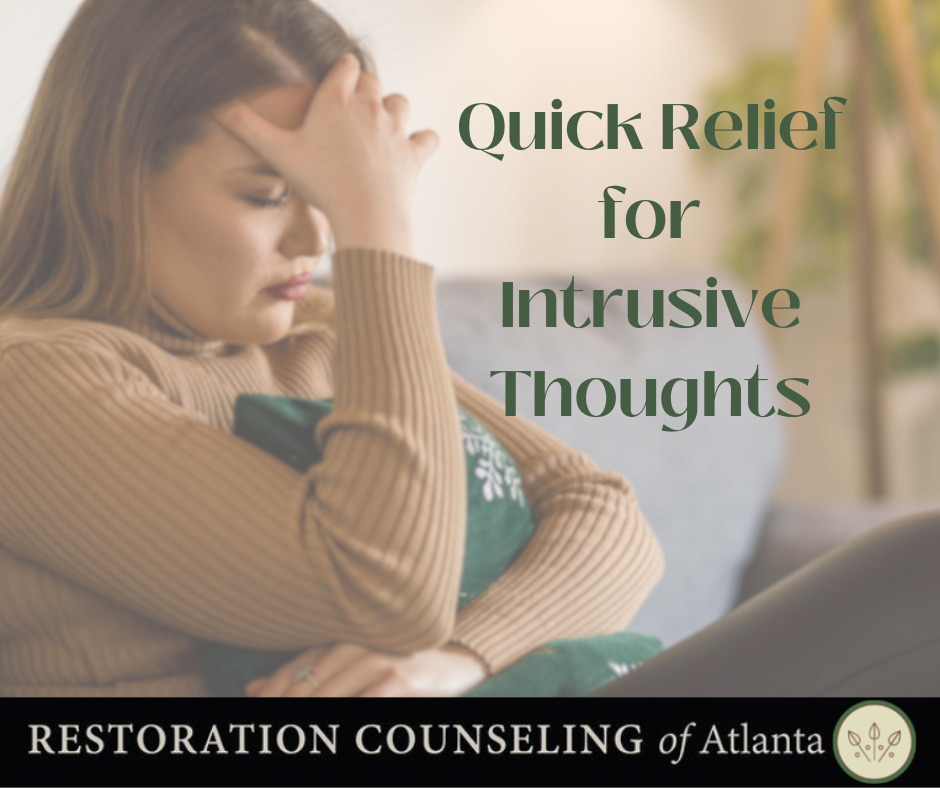Intrusive thoughts are uninvited thoughts that come to mind and do not seem to be part of the natural flow of consciousness and intentional thinking. They are very common and can provide strange, uncomfortable, or even humorous feelings. For many people, they go away quickly.
An intrusive thought can come to mind at any time and without warning. A disturbing, persistent, repetitive, and/or unwanted thought can feel threatening, particularly for those who already struggle with anxiety, OCD, depression, and other mental health conditions. However, when you engage with and worry about it, the thought—as awful as it might be—seems to have a power it does not. Trying to get rid of it paradoxically fuels its intensity, and the harder you try to suppress, distract, or substitute it, the more stubborn it becomes.
What To Do
The best way to manage intrusive thoughts is to reduce your sensitivity to them and their contents. According to Seif (2018),
“People who are bothered by intrusive thoughts need to learn a new relationship to their thoughts: that the content of thoughts is irrelevant and unimportant and that everyone has occasional weird, bizarre, socially improper, and violent thoughts. Our brains sometimes create junk thoughts, and these thoughts are just part of the everyday stream of consciousness . . . If you don’t pay attention or get involved with them, they dissipate and get washed away in the flow of consciousness.”
11 Strategies for Managing Intrusive Thoughts
- Accept and allow the thoughts to be in your mind. Do not push them away, distract from them, engage with them, or try to reason them away because doing so makes them stick around. By accepting and allowing them, you are actively and mindfully allowing them to be there without requiring any response. Therefore, you take control of them instead of them controlling you.
- Continue whatever you were doing before having the intrusive thought, while allowing the anxiety to be present.
- Label these thoughts as “intrusive thoughts.” Do not try to figure out what your thoughts “mean” because they are just thoughts, likely junk thoughts, and not truth.
- Remind yourself that these thoughts are automatic and you did not consciously conjure them. Since our thoughts are not entirely within our control, it’s natural for our minds to skew negative from time to time.
- Don’t judge yourself. Remember that you are uncomfortable with these thoughts because their content seems alien, unacceptable, and at odds with who you are. Neutral thoughts are not fought because nobody cares about them, so they don’t get stuck.
- Remember, “This too shall pass.” “Thoughts are always temporary, and there is no such thing as a permanent state of mind. Identifying a mantra like ‘This too shall pass,’ or ‘My thoughts are temporary,’ could be helpful in reducing their power,” writes Didbin (2022).
- Consider externalizing the thought through journaling or speaking it out loud, to see whether its impact changes. Creating a “worry journal” is a great way to accomplish this. Murphy (2022) writes, “To create one, you write all your irrational and rational thoughts down without filtering which ones are valid. The minute you write them down, if that thought recurs again, you’ll remember having this thought already, so you can more easily let it go from your mind. This is also a great chance to reflect on the pattern behind your irrational thoughts. If you notice that they come from your trauma, for instance, then you know what to expect with each thought you have.”
- Expect them to return. The goal of anxiety is to protect you from things that feel harmful, so these thoughts will recur until you “teach” your anxiety that they are nothing to be afraid of.
- Try not to check to see if these strategies are “working” to get rid of the thoughts as checking gives them unnecessary attention.
- Turn to prayer and meditation on verses such as 2 Timothy 1:7: “For the Spirit God gave us does not make us timid, but gives us power, love and self-discipline.” God hasn’t left us powerless against our thoughts, and the battle that rages in our minds. He gave us His Spirit which does not make us fearful but gives us the power of love and self-discipline to fight against fear.
- Talk to a counselor. If all the above strategies don’t work, a counselor can use evidence-based techniques to help you feel more empowered to handle them.
These strategies can be difficult to apply, but be consistent and patient! By applying them for just a few weeks, there is a good chance you will see a decrease in the frequency and intensity of unwanted intrusive thoughts.

Written by Paige Santmyer, MA LPC NCC CCATP
Roswell location
paige@restorationcounselingatl.com, ext. 157
Paige provides counseling to adults ages 18+ experiencing anxiety, depression, relationship issues, parenting struggles, and life transitions. She uses a personalized approach of Client-Centered Therapy and Relational Psychoanalysis, as well as techniques from Cognitive Behavioral Therapy (CBT), Positive Psychology, and Exposure and Response Prevention (ERP). She has a certificate in both anxiety and trauma treatment.
References
Childrey, K. (2020, May 18). 5 ways to free your mind from intrusive thoughts. https://www.rtor.org/2020/05/18/5-ways-to-free-your-mind-from-intrusive-thoughts/
Didbin, E, (2022, April 11). 9 Ways to cope with intrusive thoughts. https://psychcentral.com/health/ways-to-let-go-of-stuck-thoughts
Hershfield, J., Corboy, T., Winston, S., Seif, M., et al. (2023). The intrusive thoughts toolkit. Oakland, CA: New Harbinger Publications.
Holland, K. (2022, May 20). Intrusive thoughts: Why we have them and how to stop them. https://www.healthline.com/health/mental-health/intrusive-thoughts#outlook
Mikhail, A. (2023, March 8). 6 million Americans have intrusive thoughts. Here are 4 ways to get rid of them. Retrieved from: https://fortune.com/well/2023/03/08/intrusive-thoughts-how-to-get-rid-of-them/
Murphy, A. (2022, March 31). How to stop intrusive thoughts: 8 effective ways. Retrieved from: https://declutterthemind.com/blog/how-to-stop-intrusive-thoughts/
Seif, M. (2018, April 26). Unwanted and intrusive thoughts. Anxiety and Depression Association of America. Retrieved from: https://adaa.org/learn-from-us/from-the-experts/blog-posts/consumer/unwanted-intrusive-thoughts
So Very Blessed (2023, May 9). 16 Bible verses for intrusive thoughts. Retrieved from: https://soveryblessed.com/bible-verses-for-intrusive-thoughts/#:~:text=Romans%2012%3A21&text=Once%20a%20sinful%20or%20intrusive,confessing%20those%20thoughts%20to%20God.

